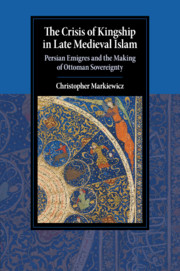Book contents
- The Crisis of Kingship in Late Medieval Islam
- Cambridge Studies in Islamic Civilization
- The Crisis of Kingship in Late Medieval Islam
- Copyright page
- Contents
- Figures
- Maps
- Acknowledgments
- Note on Usage
- Abbreviations
- Book part
- Introduction
- Part I
- 1 The Realm of Generation and Decay
- 2 Patronage and Place among the Ottomans
- 3 The Return East, 1511–1520
- Part II
- Conclusion
- Book part
- Bibliography
- Index
- Series page
2 - Patronage and Place among the Ottomans
Bidlisi and the Court of Bayezid II, 1502–1511
from Part I
Published online by Cambridge University Press: 03 August 2019
- The Crisis of Kingship in Late Medieval Islam
- Cambridge Studies in Islamic Civilization
- The Crisis of Kingship in Late Medieval Islam
- Copyright page
- Contents
- Figures
- Maps
- Acknowledgments
- Note on Usage
- Abbreviations
- Book part
- Introduction
- Part I
- 1 The Realm of Generation and Decay
- 2 Patronage and Place among the Ottomans
- 3 The Return East, 1511–1520
- Part II
- Conclusion
- Book part
- Bibliography
- Index
- Series page
Summary
The rise of Shah Ismaʿil in Iran in 1501 eventually prompted Bidlisi to make one of the most important decisions of his life. Bidlisi’s exile and migration from Tabriz to Ottoman lands in the following year initiated a fundamental change in the professional trajectory of his life. On a personal level, the loss of his friends, family, and homeland, as well as the sense of alienation he felt in a foreign land remained important themes throughout all of his subsequent autobiographical written remarks. On a professional level, the challenges associated with finding a secure and prosperous footing among the Ottomans represented the most fundamental challenge to Bidlisi’s life between 1502 and 1506.
- Type
- Chapter
- Information
- The Crisis of Kingship in Late Medieval IslamPersian Emigres and the Making of Ottoman Sovereignty, pp. 66 - 105Publisher: Cambridge University PressPrint publication year: 2019

